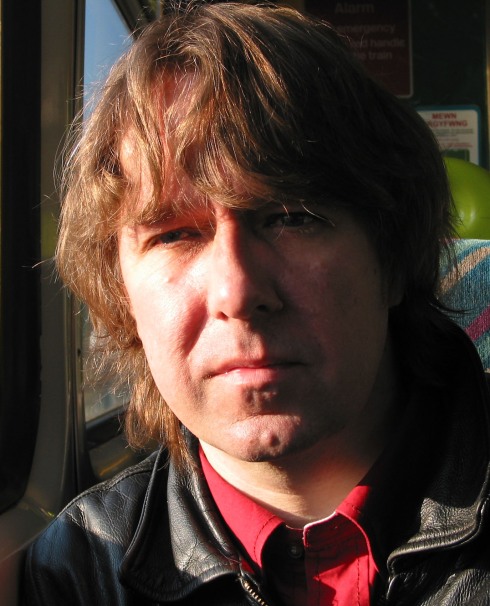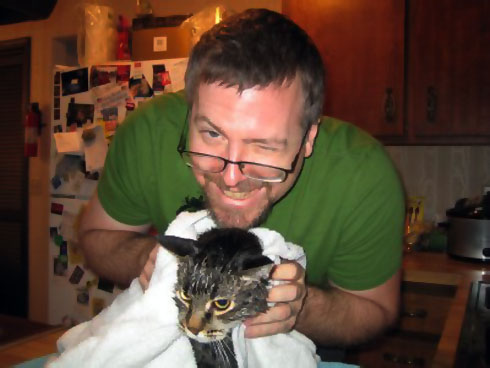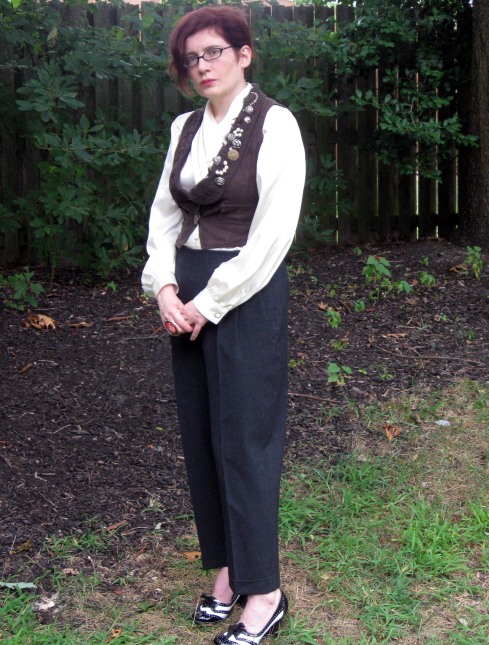
Braulio Tavares was born in 1950, in Campina Grande, a city in Brazilian North-East, and now lives in Rio de Janeiro. He studied cinema and social sciences but left both courses without getting a degree. He is a songwriter with some 60 songs professionally recorded, and works as a journalist, TV writer and translator (he has translated books by H. G. Wells, R. L. Stevenson, Isaac Asimov, Tim Powers, etc). In 1989 he won the coveted Caminho Award for SF, in Portugal, with his collection A Espinha Dorsal da Memória (The Backbone of Memory). He has published more than 20 volumes of poetry, fiction and literary essays. He is also the author of the Brazilian entries both in The Encyclopedia of Science Fiction (ed. Peter Nicholls and John Clute) and The Encyclopedia of Fantasy (ed. John Clute & John Grant). His stories have been published in the USA, Canada, Portugal, Russia and Latvia. He is also a member of the Science Fiction Research Association (SFRA). His story “Stuntmind” was selected for the anthology “Cosmos Latinos” (ed. Andrea Bell & Yolanda Molina-Gavilán). He has edited four anthologies of fantastic fiction for Casa da Palavra (Rio de Janeiro), with two more due to appear in 2011. Contact: btavares13@terra.com.br).
That was exactly what I had in mind. Or almost. A street, a city, a crowd. Cars, traffic lights, road signs. But something was wrong, very wrong. I touched the quantic watch, surprised to be in a setting so similar to the one I had planned. No more forests or deserts. Not even monsters or aliens. Not this time. I wanted a city and I was in one. I wanted excitement, motion, urban chaos … It was all there.
But … The sky was gray. People were wearing gray clothes: trousers, shirts, dresses, raincoats. The faces were gray. Sad, insipid, fading expressions. They passed by, coming and going, all weak, bent down, with arched backs. The cars alternated colors from black to gray. They moved slowly, along with the flow. Traffic lights had three different colors: dark gray, light gray and lighter gray.
Then I took a better look at me. I dressed the same way. Gray pants and T-shirt. Gray tennis shoes. Gray socks. The skin, the skin! It was slightly gray. I opened my eyes, scared. I looked at the quantic watch. The bracelet was gray. The case was gray. The dials were gray.
So I became sad. So sad that I bent down my shoulders, lowered my gaze and walked weakly, until I stopped in front of the bar. A large and spacious trailer. All painted in gray, with the front lights off, and with large gray letters saying: Joe’s Bar.
I smiled sadly. I was pleased, but still reticent. I went in, looked for Braulio, but he wasn’t there yet. I took a seat by the window, sadly watching the streets.
A waiter with large dewlaps under the eyes approached. I ordered a beer, even though what I really wanted was hemlock. I never felt so down, depressed and tormented. He moved away, dragging his feet.
I put my forehead on the table. I felt small teardrops looming. But I refrained. Not without great effort. I sat like that until the waiter brought me the beer and I heard someone else come closer and sit in front of me. I raised my head just enough to recognize him.
“Hi, Braulio.”
“Hi,” he replied, gloomily. His expression was sad, too. He looked defeated.
“Glad to see you,” I said, without expressing a single drop of happiness.
“I am also happy for this interview,” not even the most believer of the believers would buy that. Sorrow was printed on his face in such a way that even the mask of death wouldn’t be so disturbing.
“This city is … so … so …”
“Contagious.”
“Yes, strange and contagious.”
“Was that in the plans?” Braulio seemed perplexed.
“Of course not. Would it be normal if it was?” I lay my head on the table again. I let out a long and anguished sigh.
“This liquid is gray …”
“Beer, I believe. Haven’t tasted it yet. You should order one.”
“Thank you. I’d better not. I have no idea what strange effects alcohol could have in me in such a depressing environment.
“You are now a national reference in speculative fiction. Before the release of Backbone of Memory, what was your relation with the genre and the fandom?” I asked, lifting my face.
Braulio remained silent for a long while, looking at me with such sadness that I almost started crying uncontrollably. His face showed huge disappointment.
“I suppose that’s the first question?” he asked at last.
“Yes,” I said sobbing.
“I read SF since I was a kid, and many times I had the sensation that I was the only person who enjoyed those books. Years passed, and I got a small number of friends who shared my taste for the genre until, circa 1986, when I was already living in Rio, I got in touch with the CLFC, “Clube de Leitores de Ficção Científica” (SF Readers Club), through Roberto Nascimento, from São Paulo. Then I started writing SF seriously. But at that time I was a published author, after a career in jornalism and other writing jobs. I had already written some thousands of newspaper articles, many of them movie reviews. I had published some books of poetry, and a good number of mainstream and fantastic short stories, in magazines or literary journals. And I had already published, in chapbook form, one of my most successful books, The Stone of Midday or Artur and Isadora, what we call in Brazil’s Northeast “folheto de cordel”, a fantasy tale in verse, aimed at young readers.”
Braulio stopped briefly to rub his eyes, wiping off a soft moisture that was beginning to show. He swallowed a few times, frowned, took a deep breath and continued.
“The CLFC gave me something I always needed: people with whom I could talk endlessly about SF, exchange ideas, exchange books, point out authors and titles, get information. Had I not joined the CLFC and had I not began publishing my stories in its fanzine, Somnium, I would never have written the stories in A Espinha Dorsal da Memória (The Backbone of Memory), which I consider, together with Mundo Fantasmo (Ghost World), which is something of a companion volume to it, my best book.”
He stopped again, put one hand in the pocket looking for a handkerchief. Took out a cambric. Along came a piece of paper.
“On the other hand, I never had the intention of specializing in SF, I never wanted to be just an SF writer and nothing else. Even today I regret not having written mystery stories, because I’ve read mystery as much as SF. I have lots of ideas for mainstream books, poetry, theatre, horror stories… I don’t want to confine myself to a single type of literature, much as I like it.”
He wiped the teary eyes, blew his nose. He looked outside. The busy streets, shadows of people moving on the sidewalks. He clasped his hands so hard that his knuckles turned white. He raised his head a little bit trying to show himself in control, but soon fell, overcome by exhaustion.
“There’s a heated discussion about realistic literature and genre literature, about how one can inspire the other. What do you think of it?”
Braulio put the handkerchief on the table and took the piece of paper that had come along with it He cleared his throat twice, unfolded the piece of paper, read it, and closed it again.
“I see literature as a multiform field. Just like music. I listen to samba, forró, blues, classical music, jazz… by God, can there be music in this miserable land?!! I won’t say that I enjoy any style or any artist – I am fairly picky – but I like listening to things very different from each other. I like the infinite ways of combining notes, tunes, harmonies, voices, rhythms, lyrics… This gives me pleasure, being capable of feeling the greatness of Miles Davis and of Adoniran Barbosa, the greatness of Tom Waits and of Chopin. All of them different, all brilliant.”
“Funeral songs, maybe” I answered to his concern.
“These people are alive … But they are also dead. Soon we will be dead if we linger here.
“Same thing with literature,” he went on. “Graciliano Ramos is as great as Harlan Ellison, who is as great as Borges, who’s as great as Clarice Lispector or Conan Doyle. Realism and SF are not opposites, just as jazz and Beatles aren’t. To think that one precludes the other is a mistake. They complement each other. I know readers who live literature as if it were a kind of political world, where, if you are a militant for A, you have to look at B and C as adversaries. I’m not like this. My vision of literature is as a group of aesthetic experiences, not as an arena of political or market struggles.”
I surrendered to the glass. I took a shy sip, feeling the gray liquid.
“Beer, indeed”, I stammered embarrassed.
Braulio studied the glass as if it was a rare specimen. Then, he once again unfolded the piece of paper he was holding. He watched it a little longer.
“I wonder if there’s poetry in this helpless land,” he said, looking around visibly depressed.
“Do you think we still have much to learn from Anglo-Saxon authors, or is Brazil walking on its own legs now?
“We have to learn with everyone. Our problem in Brazil is that we only drink from Anglo-Saxon sources. I’ve read very little French SF. I don’t remember reading any SF from Italy or Spain. I’ve read only a dozen books of Russian SF. I have no idea about SF in the Netherlands, in Germany, in the Czech Republic, in India… OK, someone may say that those countries have not produced outstanding, memorable SF. But, then again, the same can be said about ourselves!”
“Child, never forget that this too is true:
So that justice in our cosmos may be preserved,
The angels that watch over our nations each has an opposite,
A left hand whose works the strong right hands don’t know.”
I listened to the verse at the end of his answer. I was amazed at him. Braulio read the first stanza and fell silent. His face was enclosed in a concrete mortar. But you could see a small glimmer of light escaping his misty eyes.
“And, even so – he went on, trying to overcome the dismay that hung upon him, — now and then a great SF writer is found among those not-Anglo-Saxonic literatures, such as Stanislaw Lem in Poland, the Strugatski brothers in Russia, and recently Zoran Zivkovic in Croatia. Maybe, if we paid more attention to those writers, we could be closer to discovering the road to a Brazilian SF, because we would begin to see a number of elements that are foreign to British-American SF, elements that may be seen as contributed by those nations.”
“If a nation’s angel is proud, then the other is shy
Brilliant if the nation’s angel is dull
Full of pity if the angel shows none
Laughing if it always weeps, weeping if it cannot weep.”
The waiter looked at us. So did two other customers. They looked worried. I was shocked when I realized the glass of beer had a golden hue. My lips curled into a painful and scared smile.
“Anyway, the creation of a Brazilian way can only occur, necessarily, in the moment of writing, not in the reading. Today I have read a great deal of SF, much more than I had in 1988 when I wrote The Backbone of Memory, but even so I don’t think that I am better equipped now. To give you a more direct answer: we have something to learn from any other country, but we can only teach them something, as well, if Brazilian SF and Brazilian mainstream become communicating vessels.”
“But so that order may also be preserved
(Which has always concerned the great ones more)
The nation’s angel is the greater, older and more terrible,
And from his sight the lesses always hides.
Lost, pale and bare, he shivers and sings
And there is no reproach so stinging as his smile.”
The waiter took both hands to his head. His eyes were terrified. One of the customers jumped off the stool he was sitting on and headed for the street, as if he was fleeing. The colors were spreading slowly from the glass of beer, tinting the table. We looked at each other in bewilderment. But in our eyes the truth was revealed. Carried away by a kind of madness, Braulio raised both hands up high, and laughed. He resumed poetizing.
“Bone-tired the race that raised the Towers, forgotten are their lores;
Long gone the gods who shed the tears that lap these crystal shores.
Slow beats the time-worn heart of Mars beneath this icy sky;
The thin air whispers voicelessly that all who live must die…”
Verses were poured out. The colors were spreading out more and more. The waiter gestured, indicating to us that such kind of expression was forbidden, trying at all costs to contain Braulio’s poetic rage, but no one apparently had the power to accomplish that.
That’s when we heard what sounded like a rhythmic beat, that soon became chaotic. We looked outside and saw the city falling into a kind of insane frenzy. People ran from side to side, writhing in despair. The traffic plunged into a chaos of crashes, honking and rattle. The waiter dropped everything and ran to the street. Braulio calmed down, puzzled and frightened. We looked at the outside through the window, surrounded by bright colors. Tables, chairs, counter. Refrigerators, cash register, stoves. All full of colors. The front lights flashed, advertising Joe’s Bar to the entire city.
We also saw stilts. Lots of them. On top of them, startling figures. They were clowns. Dozens of them. Hundreds. Maybe thousands. They came from all sides, from all places. The stilts were so tall they bent with every step. Their painted faces showed no mask of joy, but evil faces. Expressions of deep hatred and angry looks. Their baggy clothes with bright colors contrasting the city didn’t deceive us. They were no messengers of happiness. They advanced as guardians of sadness, soldiers of terror.
I kept pressing the button on the watch, but I knew there was on question left. And I had to ask it. We ran out of the bar. It was like bumping into a bamboo grove. We saw people pierced by stilts, abandoned crying children. Mothers were ignoring the pain of their children, taking refuge in corners, cowering terrified. We saw desperate men, begging for mercy as they were hit, injured, killed by spears that emerged like a tidal wave.
“I’ve been noticing a disdain for what was written in our past – often quite recent past actually – with people ignoring the work of authors who were our predecessors.Do you agree that the ‘past’ is past and what is worth is ‘the now and tomorrow’?”
My question almost got lost in the whirl. Braulio waved the piece of paper in the air with an insane expression, teasing the clowns that were hitting the wooden legs on the floor, gnashing their teeth and muttering scary sounds around us. We ran behind a gray truck, nudging a small crowd that had squeezed there.
“We live in an age that could be called The Omnipresence of the Present. The present moment is suffocating our capacity to think about the Past or the Future, because there is a frightening amount of information about the present hour, the present day, the present week…”
He was answering as we were being expelled from our hiding spot. We are not wanted there. They feared us, hated us.
“Social networks, like Facebook or Twitter, show how much this process has spread itself. It is possible to spend a whole hour just reading about what happened in the world in the last hour. When all your life is organized in such a way that this becomes the most important thing, how can one be interested in reading a book ten years old, or 20, or 50, or 100 years old?”
We were at last kicked out of the hiding place, which wasn’t that good after all. We ran down the street, dodging the chaos and avoiding the stilts that were trying to surround us, closing in on us
“Up-to-date information is mistaken for important information – Braulio screamed, trying to make himself heard among the noise – or, even worse, it is becoming the official definition of what is important. People are getting used to think that good information is information about the present. So, we are losing the diachronic vision (the possibility of seeing things along a temporal axis, in a before-and-after which extends itself along years or centuries) and we abandon this for a merely synchronic vision, the possibility of becoming aware of the here-and-now in an unprecedented way. According to the circumstances, “the Present” can be seen as a period of minutes or of months, but it makes no difference. People feel that if it is not in “the Present”, it’s not relevant.”
We skirted a mountain of rubble formed by overturned vehicles and injured people lying on the floor, groaning and dying. We turned left onto a street and ran into a plethora of clubs who came towards us in a wave. We were, after all, surrounded.
Braulio once again shook the little piece of paper and shouted threats before he returned to the poetry he certainly knew by heart.
“I’m Paul Bunyan and I’ll pull out this forest of staffs from the city, giving it joy again.”
“I heard a voice of warning,
a message from on high,
‘Go put your house in order,
for thou shalt surely die.
Tell all your friends a long farewell
and get your business right—
The little black train is rollin in
to call for you tonight…”
Surrounded. Entwined. Slowly crushed.
“Turning left, turning right, grasping at eyes
Lovely as a god’s. The blood flutters into the pool…
Behold! Behold the black, ungrained flesh,
The jaw’s jeweled hinge that we can barely glimpse…”
The voice was fainting, stifled by the bars.
“… And unmoor’d souls may drift on stranger tides
than those men know of, and be overthrown
by winds that would not even stir a hair…”
Then a whirlwind of irresistible force lifted the clowns with their stilts. It raised people, cars, garbage cans, signs, newspapers, children and dogs. It raised the city, tearing it from its foundations. The whole world was upside down. It raised us, throwing us into the air, twirling. But not by the threat of a giant ax sweeping the tangle of sticks. Not by the apparition – which did not happen – of a furious blue ox.
Poetry was working a miracle.
The colors first exploded in a sudden flash, tinting sky and earth with bizarre tones. They were soon stable, blending in such a way that all the nuances that had been formed were covering things up, giving them the colors they should have.
Braulio was still waving the paper, laughing out loud. He clung to the the stilts, teasing the clowns whose frowns had melted into dreadful and misunderstanding looks.
Scared of how things were going and aware that everything that has raised to the air will soon return to the ground, I pressed the button.
———————————————-
TEXT 1
Child, never forget That this is true too:
So that justice in our cosmos May be preserved,
That the angels watch over our nations each has an opposite,
The left hand works the Whose strong right hands do not know.
If a nation’s angel is proud, then the other is shy
Brilliant if the nation’s angel is dull
Full of pity if the angel shows none
Laughing if it always weeps, weeping if it can not weep.
But May Also so that order be preserved
(Which has the great ones always Concerned more)
The angel is the nation’s great, older and more terrible,
And from his sight always read the hides.
Lost, pale and bare, he shivers and sings
And so there is the stinging reproach to his smile.
(Attributed to poet Innokenti Falin, in The Translator, John Crowley, 2002)
TEXT 2:
Bone-tired the race That raised the Towers, Their lores are forgotten;
Long gone the gods who shed the tears That lap These crystal shores.
Slow beats the time-worn heart of Mars beneath this icy sky;
The thin air voicelessly That whispers all who live must die …
(Attributed to poet “Noisy” Rhysling, in “The Green Hills of Earth”, Robert Heinlein, 1947)
TEXT 3:
I heard the voice of warning,
a message from on high,
“Go put your house in order,
for thou shalt surely die.
Tell all your friends a long farewell
and get your business right-
The little black train is rollin ‘in
to call for you tonight …
(Attributed to poet John the Balladeer, in Who Fears the Devil?, Manly Wade Wellman, 1963)
TEXT 4:
Turning left, turning right, grasping at eyes
Lovely as a god’s. The blood flutters into the pool …
Behold! Behold the black, ungrained flesh,
The jaw’s jeweled hinge That We Can barely glimpse …
(Attributed to poet Louis Sacchetti, in Concentration Camp, Thomas M. Disch, 1968)
TEXT 5:
… And May unmoor’d souls drift on stranger tides
Those than men know of, and be overthrown
by winds That would not even stir a hair …
(Attributed to William Ashbless poet, in On Stranger Tides, Tim Powers, 1987)









